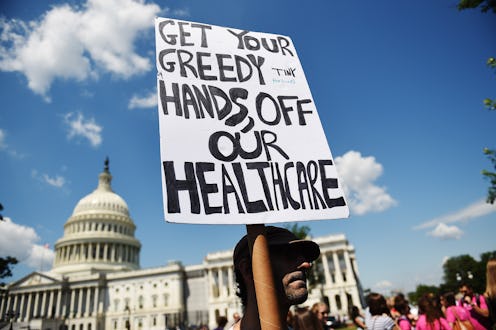News
The GOP's Health Care Failure Has One Unexpected Repercussion

In the time since President Obama left office, a strange thing has happened: Support for the former president's landmark Affordable Care Act (ACA) has actually increased, according to various polls. And it's entirely possible that the uncertainty brought about by the GOP's health care bill failure might be behind Obamacare's rising favorability.
According to RealClearPolitics, 46 percent of Americans approved of the ACA as of Tuesday. That's actually a slight decrease from the reported approval rating earlier in 2017. For instance, Gallup reported that in April, Obamacare's approval rating hit an all-time high at 55 percent. Still, the all-time high and Tuesday's rating both indicate a trend that has taken hold since last year's presidential election: Obamacare's approval rating has remained higher since November 2016 than it ever was before that time.
It's difficult — probably impossible — to identify one reason for the ACA's recent favorability, but the uncertainty surrounding the GOP's plan to replace the existing program likely has something to do with it. House Republicans failed to pass healthcare reform during President Trump's first 100 days in office, but they eventually passed the American Health Care Act in May. Now, Senate Republicans face a struggle of their own, as the Senate version of the healthcare bill has lost support in recent days.
It's clear that Americans feel the uncertainty that looms before them. Moody's Analytics tracks uncertainty in American policy using a variety of factors, including survey responses. According to Moody's most recent update, published on Tuesday, the uncertainty index has risen to its highest level all year.
To be fair, Obamacare also faced low approval ratings before it passed in 2010. In 2009, Gallup reported that 50 percent of Americans disapproved of Obama's handling of health care reform. That number was reported in July of 2009, roughly eight months before the ACA eventually passed in March of 2010. Perhaps uncertainty played a role in the ACA's rocky journey to approval, as well. (Let's not forget the state of the economy in 2009 — a cause itself for uncertainty among Americans.)
For now, Americans will have to continue to live with the uncertainty. The Senate health care bill doesn't appear to be going anywhere fast, and President Trump tweeted on Tuesday that Americans should "stay tuned." Senate Republicans may try to repeal the ACA without a plan to replace it, but that would likely only worsen the feelings of uncertainty throughout the country.